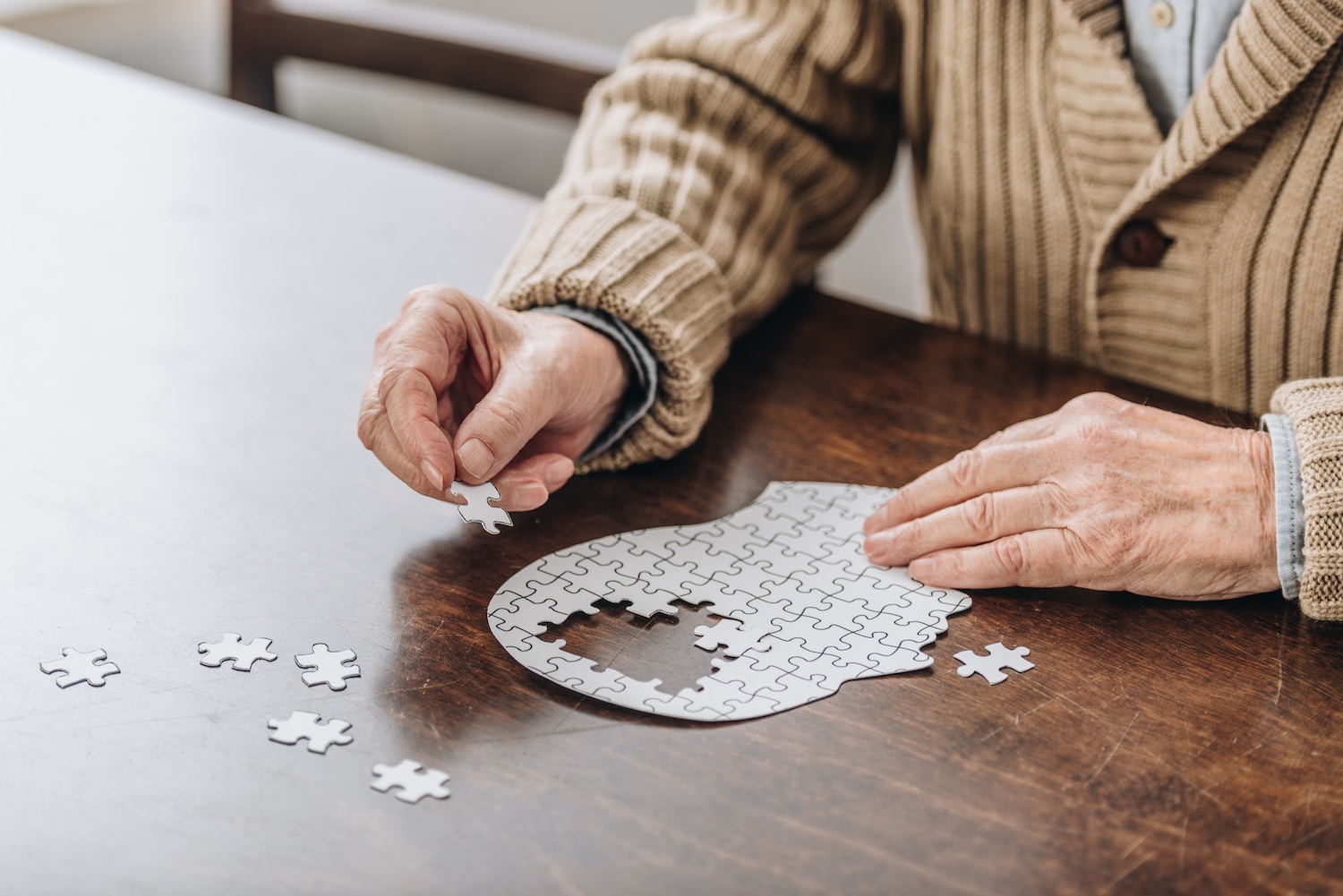Dementia, unfortunately, affects nearly 60 million people worldwide, with that number continuing to grow every year. Many people may not know that dementia is not a specific disease but a series of symptoms relating from memory loss to limited social skills to diminished cognitive ability. The level of cognition a person has can be explained via seven different stages of dementia:
- No cognitive decline
- Very mild cognitive decline
- Mild cognitive decline
- Moderate cognitive decline
- Moderately severe cognitive decline
- Severe cognitive decline
- Very severe cognitive decline
Depending on the progression of memory loss, it may be time to consider a memory care facility.
In addition to the levels of cognitive decline in dementia, it’s also helpful to divide dementia into three main stages: early, middle, and late-stage dementia. Early-stage dementia might include some mild memory loss and a decline in cognitive ability and social skills, while the middle stage will be progressively worse, ending with late-stage dementia where someone may no longer be able to eat, use the bathroom, or get around without assistance.
Knowing the signs of end stage dementia is vital to ensure you get your loved one the proper end-of-life care they need to be comfortable during these final stages.
Types of Dementia + Who Gets Dementia?
With millions of new cases of dementia being diagnosed each year, it can be very worrisome for older adults nearing their later years. While dementia is most common in people over age 65, there is also something called early onset dementia, which can occur in people ages 30 and 64. Here are some surprising statistics regarding early-onset dementia and Alzheimer’s:
- The average age is 49
- It’s more common in women, with nearly 58% of cases
- 86% of people with early onset dementia had received brain imaging in the year prior to diagnosis
Not to worry, the likelihood of being diagnosed with early-onset dementia is quite small. The chances are less than .2% for adults. And of people with Alzheimer’s disease, only about 5% had experienced symptoms before the age of 65.
Early onset dementia is only one very minimal type of dementia, however. There are five much more common forms of dementia, which include:
1) Alzheimer’s Disease

By far the most common type of dementia, Alzheimer’s disease affects tens of millions of people every year and makes up at least 60-80 percent of all dementia cases. Alzheimer’s is thought to be caused by two types of proteins (amyloid and tau) that build up on and around brain cells, causing plaque and tangles.
The plaques, in turn, negatively affect memory, cognition, speech, and the ability to perform basic physical tasks. While there is no cure or a surefire way to prevent Alzheimer’s, people can reduce their risk by:
- Maintaining a healthy weight
- Lowering blood pressure
- Limiting or avoiding smoking and alcohol consumption
- Regular exercise and a healthy diet
- Getting enough sleep
2) Lewy Body Dementia
Lewy body dementia is a condition caused by the presence of Lewy bodies, which are clumps of proteins that disrupt communication between nerve cells in the brain. It’s estimated that about 1.4 million people have Lewy body dementia, with most cases being diagnosed in people over the age of 65.
The symptoms of Lewy body dementia include hallucinations, Parkinson’s, rigidity, and other physical symptoms not commonly seen in Alzheimer’s patients. While there aren’t any treatments for Lewy body dementia, there are several medications that can help manage its symptoms.
3) Vascular Dementia
Vascular dementia happens when there is restricted blood flow to a part of the brain, often from a stroke or traumatic brain injury. The restricted blood flow can lead to issues with memory, problem-solving, decision-making, and basic reasoning skills, falling under a blanket form of dementia. Again, maintaining a healthy lifestyle— avoiding smoking, high cholesterol, and diabetes— can significantly reduce your risk of strokes and, thus, Vascular dementia.
4) Frontotemporal Dementia
Frontotemporal dementia is very rare and most often occurs in people ages 45-64. This type of dementia is the result of damaged neurons in the frontal or temporal (or both) lobes of the brain. The frontal and temporal lobes are primarily responsible for processing information, emotions, understanding language, and encoding memories. So as you might guess, the moment this is damaged, an individual may immediately feel the adverse effects on their language and communication, emotions, all 5 senses, and their memory.
5) Mixed Dementia
And lastly, mixed dementia is when someone has a combination of different types of dementia. The most frequent combination of mixed dementia is Alzheimer’s and vascular dementia. This can be hard to diagnose as many of the symptoms of different types of dementia mimic each other, but either way, it’s an important thing to note to be able to treat them properly.
What Are the Signs of Early to Mid Stage Dementia?
While different types of dementia can include different symptoms, many of them might start out the same way. Knowing the early signs of dementia can be instrumental to providing support early and getting the proper medical care in place to slow the progression of the disease.
The earliest signs of dementia might be very vague and hard to pick up. They may be brushed off as just getting older and forgetting things but maybe something much more. While the symptom may vary, some of the early signs include:
- Personality changes
- Behavioral changes
- Trouble remembering recent events
- Inability to concentrate
- Depression or social withdrawal
- Increased confusion
- Forgetting names or trouble finding the right word
As the disease progresses, other symptoms increase as an individual enters the middle stage of dementia. A person with dementia may experience increased issues including the following:
- Further changes in behavior
- Increased depression and anxiety
- Irritability and mood swings
- Repetitiveness
- Wandering
- Not remembering close family members’ names
- Getting lost in familiar places
- Trouble communicating (both speaking and understanding language)
Once the disease starts affecting everyday activities such as eating, drinking, bathing— it’s vital to get in touch with the right healthcare professionals to provide proper dementia care.
At this stage, it can be dangerous for someone to be getting care anywhere but the proper facility. A family caregiver may no longer be able to handle the needs of someone in this stage of the disease.
What Are the 7 Signs of End Stage Dementia?

End stage dementia is the final stage of the disease and is often associated with more advanced symptoms. These last stages require more palliative care that includes round-the-clock care and more efforts to manage pain on a daily basis. Some of the clearest signs of end-stage dementia include:
- Problems eating and bathing
- Complete lack of cognitive skills
- Trouble swallowing
- Physical problems like mobility and incontinence
- Complete inability to perform everyday functions
- Being non-verbal
- Drastic weight loss
Advanced dementia often requires hospice care and end-of-life care. Individuals in this stage will likely be chair or bed-bound, and precautions need to be taken to prevent pressure ulcers and keep them physically comfortable at the end of their life.
Get Proper Memory Care at Sunflower Communities
Of course, in the early stages of dementia, you want to cater to your loved one’s wishes and find them a place where they can be most comfortable and cared for, but finding the right team to care for your loved one in the later stages of dementia is vital to ensuring that end of life care.
Moving your loved one around too much as their dementia progresses can be detrimental and actually make matters worse. So finding a memory care facility like Sunflower Communities early on in the process can make each transition so much easier.
Our senior living community allows individuals at all stages of dementia to get the care they need along each step of the way. Our well-vetted staff is trained in all avenues of dementia and memory care, so you can rest assured your or your family members will be in good hands. If you’re interested in learning more about our programs, reach out today and tour our community to see for yourself.


